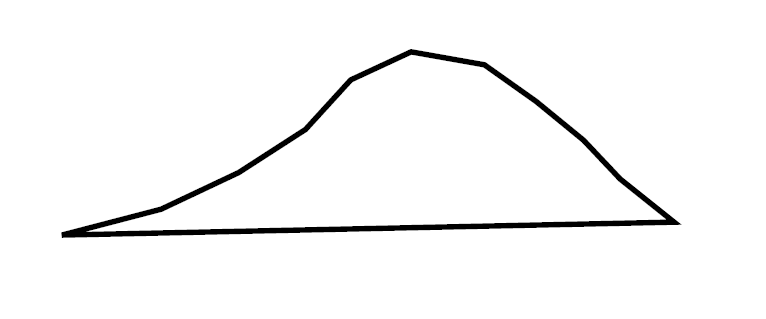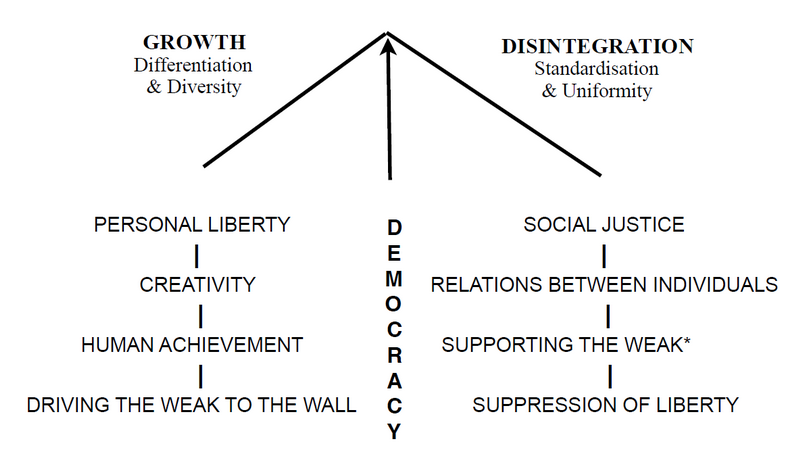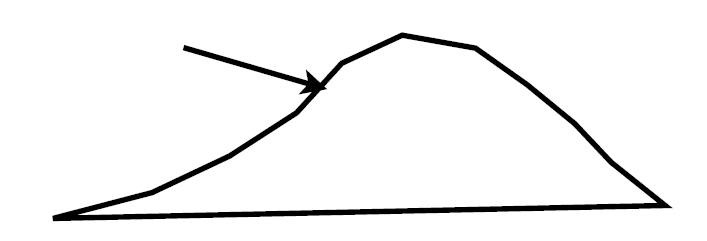A Vision For Australia
The talk, a vision for Australia, was given to many groups in the 1990's. After the talk each attendee was given a questionnaire asking what particular areas interested them and, if there was a document which described the Australia they would like, what should it contain. The result of their replies was condensed into 'I choose Australia'. Here is the talk: A Vision For AustraliaIf we repeat something often enough and get some emotion into it, then we will start to expect it, and it's likely to happen. DocumentsGoing back in history there have been some famous and influential documents. What do these documents have in common? They have influenced the decisions of many people and so made an impact on the world I see it as the sort of document that we might use to judge the performance of every It needs to come from the grass roots. To be contributed from the bottom up. But first let me paint you a backdrop to stimulate your thinking. I'll start with trends. TrendsSome years ago I came across the Pearl Curve.
To date Dr.Pearl has been proved right. It was then realised that the true significance of this curve was not that it portrayed the acceleration and decline in the growth of the population of the USA but that it illustrated every kind of growth cycle. How might that affect us? Lord Woodhousie calculated that the average age of the world's civilisations has been 200 years. Oswald Spangler found a pattern which he called the challenge/response theory. Arnold Toynbee, whose detailed study of history is published in some 20 volumes, took it a step further to explain why they lost the ability to respond to challenges. In other words the creative leaders in a society cease to be creative and maintain their position by becoming the dominant minority. Arnold Toynbee's study points out that the GROWTH stage of a civilisation is Toynbee observed that: He expands on this by pointing out that SOCIAL JUSTICE leads to RELATIONS BETWEEN INDIVIDUALS and SUPPORTING THE WEAK which, when taken to extremes, leads to the SUPPRESSION OF LIBERTY. Let me illustrate this:
How does this affect us? Let me quote Toynbee again:- A YOUNG NATION IS CONFRONTED WITH A CHALLENGE FOR WHICH IT FINDS A Wherever we are, whatever we define the challenge to be now, we need a different response from what we have been using. What can we do about it and where do we want to be? I believe as a nation we are about here on the Pearl Curve
and we are in a unique position to put ourselves on a very exciting course - to accelerate a growth stage over a long time - growth in many areas. To do this we need to set ourselves a challenge, we need a mission - a vision. We need a vision that is greater than survival. Something that will excite and inspire us. I am going to ask you to come up with some ideas for that challenge, for that vision. To quote Toynbee again:- "The greater the challenge, the greater the stimulus" We need the vigour of new ideas and attitudes to meet that challenge.That brings me to the next point: Hybrid VigourDuring my school days I learnt about hybrid vigour. The same thing happens with people. Let's look at history. The group of Islands known as Great Britain became the melting pot for many different and enterprising races. Let me quote you a verse that illustrates this: THE ROMANS FIRST WITH JULIUS CAESAR CAME THUS FROM A MIXTURE OF ALL KINDS BEGAN The hybrid vigour created in that group of islands spawned one of the greatest Empires the world has ever known. The USA opened its doors to enterprising peoples of all races who were attracted to that land of opportunity from all corners of the world. This hybrid vigour created the greatest economic empire the world has ever known. There are instances around the world where people have mixed and not produced this hybrid vigour. But when you analyse them, those people came with a poor attitude, without hope, and usually against their will. Very often they were not free in their new environment. The vigour I am talking about goes with an attitude of hope and positive expectancy. This injection of hybrid vigour means that there is always some group developing a string of new ideas to deal with the next challenge. And that's important because as Arnold Toynbee noted: John Naisbitt has devoted many years to the study of community, national, and world trends. Donald Horn, in a talk to an ALP non-political seminar, stated "The future of Australian society lies, above all else, in the development of Australian creativity." | What is the significance of that to us? Over 20% of people living in this country were born overseas. Think of the richness of this mix, think of the hybrid vigour, think of the dynamic effect this will have on our Pearl Curve in all areas of our lives - arts, sciences, religion, economy, politics, and society as a whole. We all have ideas. How do you tell a good idea? "AS LONG AS THE SPARK OF CREATIVE POWER IS STILL ALIVE IN US AND WE HAVE THE GRACE TO KINDLE IT INTO FLAME THEN OUR EFFORTS TO ATTAIN THE GOAL OF HUMAN ENDEAVOUR CANNOT BE DEFEATED." And that brings me to the third point - The facts don't count.What facts? Some years ago the ABC went on strike. As I was unable to hear my normal news programme on the way to work I listened to FM music. I put it to you that the facts only count when we allow them to affect our feelings, or to influence our vision of the future. We hear a great deal about the disaster situations in Australia. These are usually measured in figures - inflation, exchange rates, unemployment, price of commodities, AIDS sufferers, drug addicts - and we allow this to affect our feelings and our vision of the future. I'll read you a quote from a report entitled 'INVESTIGATIONS INTO CURRENCY AND FINANCE". The eminent men who compiled this report came to this conclusion: This report was compiled in 1909. I often come across people who claim they don't want to generate any more income because it might affect their pension or put them in a higher tax bracket. Just imagine what the feeling about that one fact is doing to the economy of this country. If the facts don't count what does? Professor Toynbee observed that: Philosophies are exciting, they create hope, enthusiasm, and motivation. They point us towards the future. Napoleon Hill spent a lifetime studying what made certain people exceptionally successful. He wrote a massive volume on "The Laws of Success" and a popular best seller that's sold millions of copies. He earned a doctorate in the course of his studies. We have been conditioned to believe that our ills can be fixed by manipulating economic factors. If we get the "right" economic factors in place then we have a fix. How often do we as a nation allow these emotions to be influenced by current facts instead of our vision of an exciting future. Let's say we had such an exciting vision, pledge, purpose or whatever we call it - what could be the catalyst that would move us towards it? LeadershipLeadership is such a catalyst. Oswald Spangler wrote: Bergen, another historian wrote: Who might that soul be? Why not you? We need challenges. When we allow someone to take away our RESPONSIBILITIES we lose CONTROL. Take away their challenges and so, as Toynbee wrote, begins a "LONG DRAWN OUT LIFE IN DEATH." A true leader throws in a challenge not a sop. We tend to look for leaders in politics. I suppose that's because that occupation has a high exposure. But leaders occur in all walks of life, and there are more leaders out of politics than in politics. There are leaders in the arts, sciences, religions, business, defence forces, and society in general. As far a politics is concerned an interesting trend has been observed by Naisbit: In other words the swinging voter will end up in the majority - we may even end up voting for the person, not the party. I have quoted a great deal from historians and futurologists. Let me read you some quotes:WHAT YOU DO NOT LIKE WHEN DONE TO YOURSELF, DO NOT DO UNTO DO UNTO OTHERS WHAT YOU'D LOVE TO HAVE YOURSELF The Prophet Muhammad HURT NOT OTHERS IN WAYS THAT YOU YOURSELF WOULD FIND HURTFUL Buddah ALWAYS TREAT OTHERS AS YOU WOULD LIKE THEM TO TREAT YOU YOU CANNOT ATTAIN RIGHTEOUSNESS UNTIL YOU GIVE OTHERS OF WHAT YOU LOVE TO HAVE FOR YOURSELF The Koran WHAT IS HATEFUL TO YOU, DO NOT DO TO YOUR FELLOW MAN. The Talmud Let me read you quotes from three eminent men in the same vein…… CONSCIOUSLY OR UNCONSCIOUSLY EVERY ONE OF US DOES RENDER SOME SERVICE OR OTHER. IF WE CULTIVATE THE HABIT OF DOING THIS SERVICE DELIBERATELY, OUR DESIRE FOR SERVICE WILL STEADILY GROW STRONGER, AND WILL MAKE NOT ONLY FOR OUR OWN HAPPINESS BUT THAT OF THE WORLD AT LARGE. Gandhi I DON'T KNOW WHAT YOUR DESTINY WILL BE, BUT ONE THING I DO KNOW; THE ONLY ONES AMONG YOU WHO WILL BE TRULY HAPPY WILL BE THOSE WHO HAVE SOUGHT AND FOUND HOW TO SERVE Albert Schweitzer If all the world's great thinkers, philosophers, and philosophies have come to these conclusions then I don't see how we can ignore them in putting together an exciting vision for Australia. Let me make some other comments that might be relevant when considering what sort of things could be covered in the document. Remember: "Civilisation must have a faith" Can we see a nation --Where the "She'll be right" attitude is prevalent because people make it right? Should our document include a challenge or two? The next civilisation will probably be a global civilisation.With the effectiveness of communications increasing daily I cannot see how another civilisation can crop up in a regional area and not span the world. What sort of civilisation will it be? Where will it start? I have talked about historical trends and where we are and could be; I've covered the creative forces that are building up through hybrid vigour; I've discussed the importance of leadership as the catalyst energising and guiding these forces; I've pointed out why the facts don't really count; I've suggested we need challenges; I've pointed out the importance of creativity; I've given you some thoughts on what might form part of an Australian Document. In what direction would you like to see Australia moving? What would you like to have included in the document and what would you call it. |


